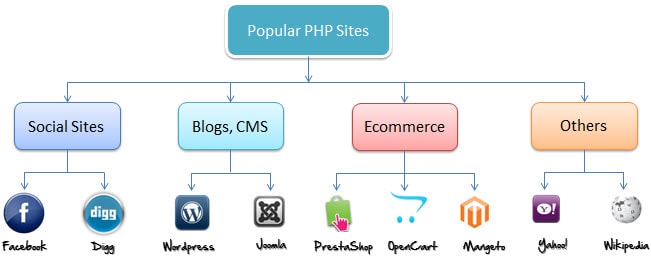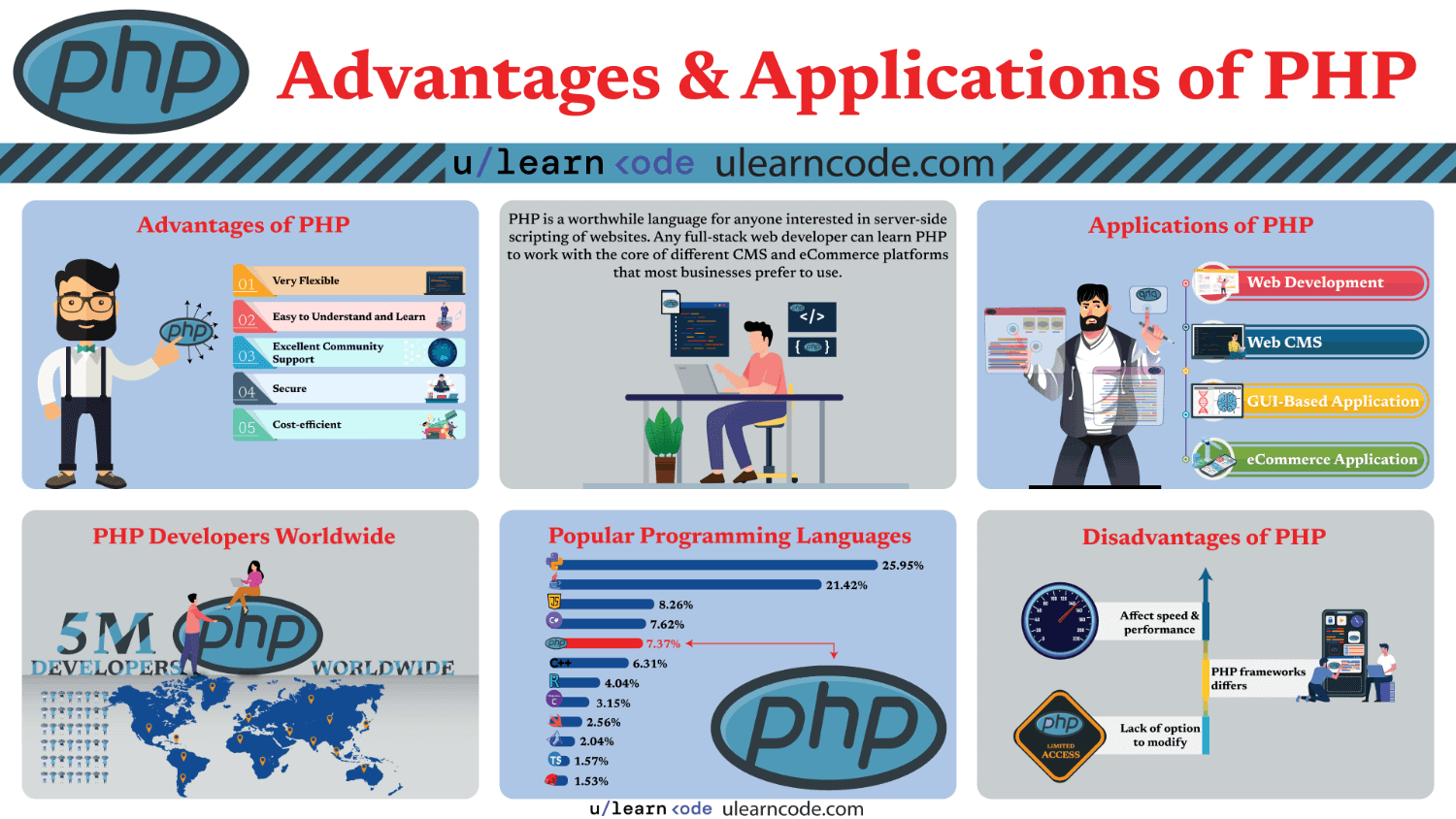PHP might not be considered a modern programming languages, but it is still being used in over 79.1% of the websites according to data provided by W3Techs. Stats never lie and most websites are indeed utilizing PHP in one way or the other.
WordPress is one of the most popular Content Management Systems (CMS) in the world. Its core is also based upon PHP, which makes it a crucial language for website developers. Other popular CMS such as Drupal and Joomla are also based upon PHP.
PHP has recently released their 8.0 version in November 2020, which introduced some major changes and features. The language is open-source with a huge community that loves to contribute.
Contents
Where PHP Is Used?
This scripting language is mostly used on the web development side, but being a general-purpose language, there are some other applications as well:
1. Web Development
As a server-side language, PHP supports over 244 million websites built on the internet. It is the strongest core language for any website because it integrates well with a variety of databases. Many web servers support the latest PHP version which can be updated upon new releases.

PHP also supports many web-based applications to continue working properly. Facebook was originally built with PHP and Wikipedia, and Tumblr and Baidu also use PHP.
The language is only focused on server-side, but if you want to become a full-stack web developer, then start your journey by choosing any of the best web development courses.
There is no doubt that PHP is the king of server-side programming but there are some other best web development languages available such as Python and Ruby, which also provide a strong core to a large number of websites.
2. Web Content Management Systems
The Content Management System or CMS is installed on any web server to provide you with all the tools needed to manage your website. WordPress is one of the most popular content management systems, with over 75 million websites. It is also built upon PHP.
Some other popular CMS like Drupal and Joomla are also based upon PHP. The reason why CMS systems rely so much on PHP is that the language supports a number of databases including:
- MySQL
- MS Access
- Oracle
It also integrates well with other services using a variety of protocols.
If you want to test the efficiency of PHP language then try using WordPress, which you can easily learn by choosing any WordPress course. Moreover, there are some other languages such as Java and .NET framework which is a good alternative for any developer who wants to create their own CMS.
3. GUI-Based Applications
Although PHP is a scripting language that is mostly used on the server-side to program web applications, it is also capable of creating GUI-Based applications where a user can interact with many PHP based elements on the front-end of a website.
There are multiple tools that can be integrated with PHP such as:
- DevelStudio
- PHP-GTK 2
- ZZEE PHP GUI
These tools provide an environment for PHP developers to create graphical user interface-based desktop applications where users can perform different actions for their desired output. Moreover, these tools compile the PHP scripts in “.exe” format to run it as a proper application.
The language is not specifically made for GUI applications, unlike other languages such as Python and C++ which are widely used to develop desktop applications using a range of frameworks.
If you are interested in learning more, feel free to join any GUI application development course that will guide you step by step.
4. eCommerce Applications
eCommerce is a trillion-dollar industry which is exponentially growing as more and more people move towards online stores. A large percentage of eCommerce platforms including OpenCart, Magento, AgoraCart, Ubercart, and Zen Cart are created with PHP.
The core of WordPress CMS and its popular Woocommerce plugin is also written in PHP, which clearly shows the dominance of this language in the eCommerce industry. There are many frameworks that facilitate the development of eCommerce applications such as:
- CodeIgniter
- CakePHP
Although PHP is a reliable language, there are also some other eCommerce Application development languages such as Java, which has more powerful development tools. You can start creating your own eCommerce apps by learning from eCommerce app development courses.
Why Should You Learn PHP?

There are various reasons to learn this scripting language as it facilitates online businesses, websites, and stores.
1. Very Flexible
PHP has a relatively easy syntax as it is a dynamically typed language. There are no hard and fast rules to write scripts, and programmers can test their applications despite minor errors in the code.
2. Easy to Understand and Learn
The syntax is fairly easy and even some non-programmers can understand some parts of the code without learning the language. It is an excellent choice for beginners who can start their learning journey by choosing the best PHP courses.
3. Excellent Community Support
PHP has the 3rd largest community on StackOverflow. This large community can answer any of your questions or problems that you might face throughout your PHP career.
4. Secure
PHP is secure as a server-side language, making it a more reliable choice for business owners as it possesses fewer security concerns.
5. Cost-efficient
A PHP developer can develop a website at a minimal cost because the language is free and there are no licenses required for its frameworks or libraries. It also integrates very well with different databases such as Apache, MySQL, and PostgreSQL.
Wrapping It Up
PHP is a worthwhile language for anyone interested in server-side scripting of websites. Any full-stack web developer can learn PHP to work with the core of different CMS and eCommerce platforms that most businesses prefer to use.